Are you thinking about getting security cameras for your business but feeling a bit overwhelmed by all the options? No worries! This guide is here to help you understand the basics of security camera systems in a way that’s easy to grasp. Whether you want to upgrade your current setup or start fresh, this guide can help you find the best security cameras for your business.
What is a business security camera system?
A business security camera system is like a set of electronic eyes and ears designed to watch over and record what happens in and around your business. It’s there to boost security, discourage theft, and provide evidence in case something goes wrong. These systems come in different types, with various cameras, storage options, and monitoring features to keep your assets, employees, and operations safe.
What are the basic elements of a business security camera system?
Let’s break down the basic parts of a business security camera system:
- Commercial-Grade Security Cameras: These are the cameras that do the actual recording.
- NVR (EnVR): Think of it as the brain that stores all the recorded footage.
- Monitors: These are like your business’s TV screens to view what the cameras are recording.
- Power: The energy that keeps everything running smoothly.
- Video Management Software: This is the software that offers more insight and helps you manage your recorded video footage.
- Cloud-based Services: Modern features that allow you to store and access your footage from anywhere.
Security Camera Breakdown: Analog vs. IP
When considering security cameras for your business, you’ll encounter two main types: Analog and IP (Internet Protocol) cameras. Let’s break down the key features of each:
Analog Security Cameras for Businesses
Analog cameras are the original tech when it comes to business security cameras and are still super popular, making up around 70% of the cameras people are using right now. They work a bit like cable TV, using digital signals. There are two kinds of analog cameras: standard and HD. The older standard ones are becoming less common, but the HD analog cameras are like the upgraded version, giving way better quality starting from 2MP (megapixel) and up.
These cameras send videos over coaxial cables straight to a DVR box. They provide standard-definition video, which is like the regular quality you see on TV screens (640×480). Setting up these cameras is simpler compared to some other types, making them a budget-friendly choice. If you’ve already got some old analog cables and housing, going for an HD Analog system is a good way to get better-quality videos without spending a ton.
In a nutshell, analog cameras are like the classic choice that still gets the job done without breaking the bank.
| Lower entry price Reuse older cabling Simpler to setup |
Low-resolution video Fewer enhancements No on-camera analytics Less compression |
IP (Internet Protocol) Security Cameras for Businesses
Think of IP cameras as the superheroes of business security cameras. They’re the tech whiz-kids in the surveillance world, basically acting as their own little computers within the system. These cameras don’t just capture video; they send it like a pro through the network, giving them some serious advantages.
One cool thing about IP cameras is that they can handle high-quality videos by squeezing them down from lots of megapixels. This means you get really crisp and clear images. They’re not just regular cameras; they can do special tricks like making videos look better in tricky lighting (that’s backlight compensation for you) and even analyzing videos to detect things like when someone crosses a line.
Now, here’s the thing: these superhero cameras come at a cost. They’re a bit pricier, and you need a special kind of cable called CAT5 (Ethernet) to make them work. But, here’s why people go for them – they give you the absolute best video quality. They’re like the kings of resolution, capturing all the details.
Also, they’re pretty flexible with the whole power, video, and data thing. All of that gets sent through one single cable. IP cameras fit right into your existing high-bandwidth network, bringing extra perks like on-camera storage, video analytics, and more protection options.
Overall, IP cameras are like the superheroes of the surveillance world, bringing top-notch video quality and some cool features to the table.
| Highest resolution available Smart video compression efficient storage Image enhancements On-camera analytics |
Higher price Requires CAT5 (Ethernet) cabling |
Business Security Camera Form Factors
When it comes to security cameras for your business, picking the right design is pretty important. Different shapes and styles bring their own set of benefits and things to think about. Let’s check out the different types to help you decide what might work best for your needs:
Dome Cameras
Dome cameras are a go-to choice because they can fit in anywhere. They’re sneaky inside and make it tough for anyone outside to figure out where they’re pointing. But, be mindful that their larger shape could block some views.
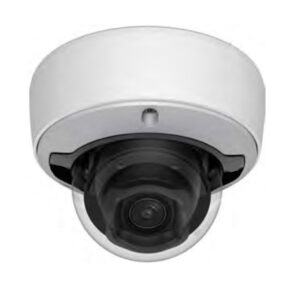
Turret Cameras
Turret cameras are like little pods with separate “eyes” for the lens and IR illuminators. They’re clear about where they’re looking, but they don’t move around as much. Setting them up, especially outside, needs a bit more attention. Turrets often have better protection against outdoor elements.
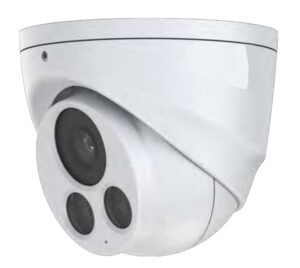
Bullet Cameras
For tough, intimidating surveillance, bullet cameras fit the bill. They’re longer and usually have zoomable lenses for watching things from far away. You can spot them easily, and people know you mean business. Just remember, this toughness might come with a higher price.
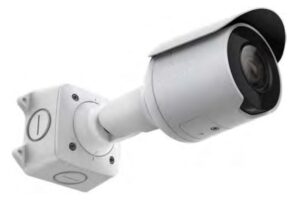
Fisheye Cameras
Fisheye cameras give you a cool 360° view of everything. They’re popular in places like restaurants and stores, capturing angles other cameras might miss. They even “dewarp” images so you can see better. But, they might not be as clear at really long distances, and they can cost a bit more.
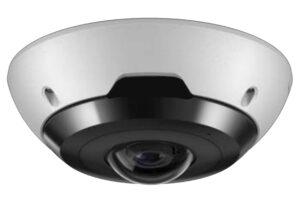
Pinhole Cameras
When you need a camera to be super sneaky, pinhole cameras are your friends. They can hide in ceiling tiles, and you won’t even notice them. They might not have the highest quality, but for special cases where you want things low-key, they get the job done.
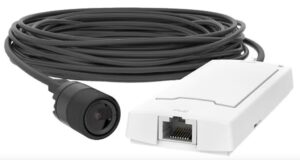
Cloud-Connected Cameras
A cloud-connected camera is a security camera that sends its video footage directly to a remote cloud server over the internet, giving you access to live feeds and recorded footage from anywhere with an internet connection, instead of storing the data locally on a physical device like a DVR or NVR. A cloud-connected camera is useful when watching live video or checking recorded clips remotely, as long as you’re connected to the internet. This is a good option for monitoring businesses that have multiple locations.
Pricing for Business Security Cameras
The price of video surveillance systems varies based on factors like:
- Size of your business
- Number of cameras needed
- Storage length needed
- Length of video storage
- Features you need (managed video, video analytics, motion detection, etc.)
According to Business News Daily, Pricing for video surveillance systems typically begins at approximately $50 per month, catering to basic setups with one or two cameras. For more sophisticated systems with multiple cameras, costs can extend up to $5,000.
Do More with Security Cameras in Your Business
Picking the right security camera system for your business might seem overwhelming, but fear not! This guide breaks it down into easy-to-understand bits. Whether you’re eyeing an upgrade or starting fresh, understanding the basics is key. From the core components of a security system to the choice between analog and IP cameras, and exploring various camera designs, we’ve got you covered. Armed with this knowledge, you’re ready to navigate the security camera landscape and keep your business safe and sound. Happy surveilling!
At Envysion, we see surveillance video footage as one piece of a larger puzzle. Our managed video solutions make all of your video and audio available through one convenient application. Monitor live and recorded security footage from across multiple locations and cameras with a single login on desktop and mobile devices.
Protect your business, brand, people, and profits with Envysion – reach out to us today.
